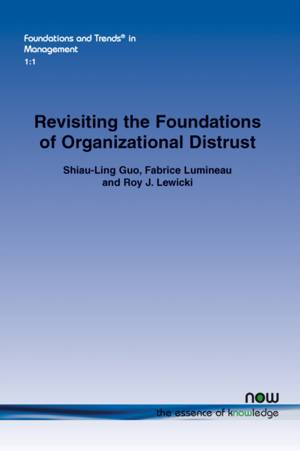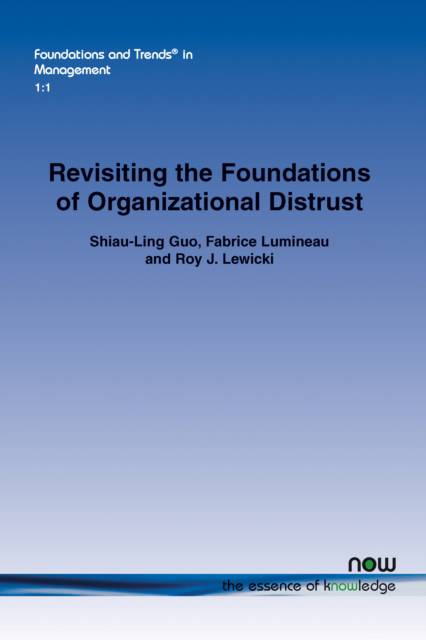
En raison d'une grêve chez bpost, votre commande pourrait être retardée. Vous avez besoin d’un livre rapidement ? Nos magasins vous accueillent à bras ouverts !
- Retrait gratuit dans votre magasin Club
- 7.000.000 titres dans notre catalogue
- Payer en toute sécurité
- Toujours un magasin près de chez vous
En raison de la grêve chez bpost, votre commande pourrait être retardée. Vous avez besoin d’un livre rapidement ? Nos magasins vous accueillent à bras ouverts !
- Retrait gratuit dans votre magasin Club
- 7.000.0000 titres dans notre catalogue
- Payer en toute sécurité
- Toujours un magasin près de chez vous
Revisiting the Foundations of Organizational Distrust
Shiau-Ling Guo, Fabrice Lumineau, Roy J Lewicki
83,95 €
+ 167 points
Description
Revisiting the Foundations of Organizational Distrust systematically discuss the theoretical perspectives on the relationship between distrust and trust, highlights the potential research opportunities and challenges pertinent to distrust studies, and draws implications of distrust research for strategic management. The literature on distrust has grown substantially since the beginning of the 1960s. One initial observation is that the extant research uses many different definitions and perspectives on distrust, and this diversity exacerbates the fragmentation of the literature. The variety of perspectives on distrust only re-emphasizes the necessity of gaining a better understanding of how distrust links to and distinguishes itself from trust before exploring the prospect and challenges of distrust research, particularly for scholars in strategic management. More specifically, it is crucial to draw attention to the novel insights that distrust studies may bring about for strategic management and organizational theory scholars. The analysis is organized into six parts: (1) discussing extant research on distrust in organizational settings; (2) examining various theoretical perspectives on the relationship between trust and distrust; (3) illustrating the extant empirical evidence of the relationship between trust and distrust; (4) considering the potential role of distrust in relationship repair; (5) pointing out specific research avenues in strategy areas; and (6) highlighting empirical challenges of studying distrust in organizational settings. Based on an examination of existing research on distrust in organizational settings in the first section, the authors extend the discussion to various theoretical perspectives and empirical evidence of the relationship between trust and distrust in the following sections. The authors also suggest specific promising research opportunities and challenges of distrust studies in the last three sections. As distrust spans many different research areas, Revisiting the Foundations of Organizational Distrust should be of interest to scholars in management as well as in the sociology of organizations and organizational psychology.
Spécifications
Parties prenantes
- Auteur(s) :
- Editeur:
Contenu
- Nombre de pages :
- 102
- Langue:
- Anglais
- Collection :
- Tome:
- n° 1
Caractéristiques
- EAN:
- 9781680832488
- Date de parution :
- 16-02-17
- Format:
- Livre broché
- Format numérique:
- Trade paperback (VS)
- Dimensions :
- 156 mm x 234 mm
- Poids :
- 154 g

Les avis
Nous publions uniquement les avis qui respectent les conditions requises. Consultez nos conditions pour les avis.






